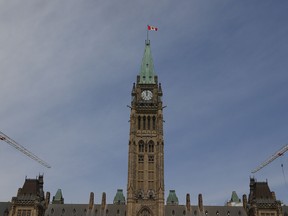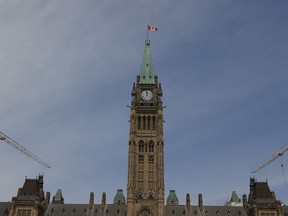Hey feds, stick to your own lane and butt out of provincial matters

Ottawa needs to remember Canada is a federation not a unitary state. Blurring who’s in charge destroys democratic accountability

Article content
An old joke explains a lot about public policy in Canada. A foundation wanted to commission a book on elephants. A U.K. author suggested “The elephant and the British Empire.” The German author proposed a 10-volume “History of the elephant.” The French author suggested “Les éléphants et l’amour.” And the Canadian author? “The elephant in federal-provincial relations.”
Advertisement 2
Article content
Although our founding prime minister, John A. Macdonald, wanted Canada to be a unitary state like the United Kingdom, our cultural, historical and geographical divisions led our founders to create a confederation with two sovereign levels of government. Powers under the British North America Act (now the Constitution Act) were allocated to accommodate regional differences.
In general, the federal government was given responsibility for national priorities, including defence, criminal law, banking, foreign policy and interprovincial transportation and communication. The provinces, which were thought to be closer to the people, were assigned education, health, social services and municipalities, which have come to dominate public expenditures. Some powers were allocated jointly, such as direct taxation and the environment (for things like pollution and endangered species). In later years, we adopted a Charter of Rights and Freedoms, and the western provinces were given control over natural resources, like the other provinces.
The BNA Act did give the federal government the power to disallow provincial legislation, as in a unitary state, but the last time it did so was in 1943. Today, federal and provincial governments work in their own spheres but cooperate when powers conflict. Canada functions best with federal-provincial agreements, not unilateral federal actions. A shining example is our tax collection agreements for income and sales taxes, which achieve harmonization and lower compliance costs yet enable provincial flexibility.
Article content
Advertisement 3
Article content
In recent years, however, the federal government has intruded into more and more provincial jurisdictions. By offering federal tax dollars to adopt “shared-cost” programs, the feds have distorted provincial decisions over childcare, infrastructure, housing and other matters. Even where there is joint constitutional responsibility, the federal government has been forcing its unilateral decisions onto the provinces rather than reaching agreements.
The latest dust-up between Ottawa and a province is over Quebec’s caribou policy. Federal Environment Minister Steven Guibeault has issued an emergency decree for a federal plan to protect declining caribou populations in Quebec. Arguing that Quebec has been too slow to live up to its responsibilities, Ottawa is moving ahead, with public consultations underway. Quebec estimates that the federal plan would lead to a loss of 2,000 jobs and a 4.1 per cent decline in logging.
Ottawa may believe Quebec’s caribou policies are insufficient and is obviously free to criticize, but it is not clear why this environmental issue needs federal management. It should be up to Quebecers to handle it. Would Ottawa like Quebec to barge in on federal monetary policy like B.C. and Ontario have recently?
Advertisement 4
Article content
Quebec always jealously guards its provincial jurisdiction, of course. But it is not the only province unhappy with Ottawa. Alberta and Saskatchewan strongly oppose the federal clean electricity plan and cap on oil and gas emissions, both of which they contend (correctly!) are unrealistic. Though the provinces have expressed their willingness to develop their own plans in these areas, Minister Guilbeault has preferred to act unilaterally. Ottawa should instead sit down with the two provinces to negotiate targets and then let the provinces as resource managers figure out how best to achieve them — as you would expect in a federation when both governments share environment responsibilities.
Governments sticking to their knitting reduces conflict and encourages accountability, which is best achieved when it is clear who is in charge. Health care is a good example. Under the Canada Health Act, the federal government has imposed restrictions that the provinces must follow in order to receive federal funding. The result is buck-passing. The federal government blames bad provincial administration for today’s horrific wait times, while the provinces blame the feds for underfunding the system. Stuck in the middle, Canadians don’t know who to turn to for reform.
Advertisement 5
Article content
Accountability will soon become a problem with housing policy. Prime Minister Justin Trudeau was right when he said the federal government had no primary role in housing policy, but he clearly can’t keep his fingers out of the pie. Given how much housing markets differ across Canada, federal involvement makes little sense. Toronto, Victoria and Vancouver are clearly unaffordable, with median housing prices at 11 times income. But affordability is much less pressing in Regina, Edmonton and Winnipeg, where prices are a more traditional four times income or less. In rural areas, housing is even more affordable, which is why many people are leaving cities.
Current federal policy requires municipalities to relax their zoning laws if they want federal money but, as we have seen in Calgary, this can be very unpopular among people who prefer to live in less congested neighbourhoods, as many Canadians do. Though B.C. and Ontario were already taxing vacant property, the feds have brought in a complex “unused housing tax” that applies even where affordability is not a problem.
Advertisement 6
Article content
Recommended from Editorial
If the federal government wants to make housing more affordable, it should focus on its own policies that contribute to higher prices. Monetary policy should get inflation back to target. Unrestrained immigration, which has driven up demand for housing, should be limited by the availability of new housing. Ottawa should also cut back on policies that push up prices by subsidizing homebuyers via tax incentives or discouraging development via capital gains taxes and other levies.
Politicians: first do no harm. And then stick to your lane. Ottawa needs to remember Canada is a federal not unitary state. As our Constitution recognizes, each province has its own traditions and economic structure. One size does not fit all.
Bookmark our website and support our journalism: Don’t miss the business news you need to know — add financialpost.com to your bookmarks and sign up for our newsletters here.
Article content
Source link



